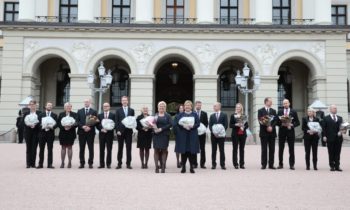 The new Prime Minister, Erna Solberg, presented Norway new government Wednesday afternoon. The new government consists of 11 representatives from the Conservative Party (Høyre) and seven representatives from the Progress Party (FrP). “This is a government with a very strong mandate. There are 96 mandates for change. We wish to manage the majority that we achieved together with the Liberal Left Party (Venstre) and the Christian Democrats (KrF). I want to thank Knut Arild Hareide and Trine Skei Grande,” said Solberg.Børge Brende (48) from the Conservative Party was a member of parliament from 1997 to 2009, and was previously Minister of Environmental Affairs from 1997-2009, and then Minister of Trade from 2004-2005. He has also held the position as CEO of the World Economic Forum.
The new Prime Minister, Erna Solberg, presented Norway new government Wednesday afternoon. The new government consists of 11 representatives from the Conservative Party (Høyre) and seven representatives from the Progress Party (FrP). “This is a government with a very strong mandate. There are 96 mandates for change. We wish to manage the majority that we achieved together with the Liberal Left Party (Venstre) and the Christian Democrats (KrF). I want to thank Knut Arild Hareide and Trine Skei Grande,” said Solberg.Børge Brende (48) from the Conservative Party was a member of parliament from 1997 to 2009, and was previously Minister of Environmental Affairs from 1997-2009, and then Minister of Trade from 2004-2005. He has also held the position as CEO of the World Economic Forum.
Bent Høie (42), also from the Conservative Party, has been appointed Minister of Health. He has been a member of parliament since 2000.
Siv Jensen (44), leader of the Progress Party, will be Norway’s new Minister of Finance. She has been leading the Progress Party since 2006, and has a diploma from Norways School of Economics.
The Conservatives took 11 of the 18 Cabinet seats, including the foreign and defence minister posts, while Progress — the junior partner — got finance, oil, justice and four other portfolios.
Solberg, 52, is one of only three ministers in the 18-member Cabinet who are over 50. The average age is 44. Half of the ministers are women.
The youngest minister is the 35-year-old Education and Research Minister Torbjoern Roee Isaksen, who comes from the Conservative party.
Boerge Brende, Ine Marie Eriksen Soereide and Monica Maeland were appointed as the foreign minister, the defense minister and the trade and industry minister respectively.
The new prime minister wants a stronger education system and better student performance especially in mathematics and science subjects, and more efficiency in the public services through more participation of the private sector.
Progress Party (FrP) youth branch leader Himanshu Gulati becomes Deputy Minister at Justice Ministry. 25-year-old Indian background politician says he understands why people might react to Progress Party’s asylum and immigration policy.
Acording to NRK’s report, Gulati says they are going to follow a policy they believe is right. -We understand that people can react to it, but our job is to do what we think is right, says he.
Tough immigration and asylum issues await the 25-year-old politician and he will speak on those issues on behalf of the Government. One of the most controversial issues in the new period is closing of reception centers for the asylum seekers who refuse to cooperate with the authorities.
– I think many people already notice that there is a new government. We will work to close the reception for those who will not cooperate with the authorities, and for faster transmission of such criminal asylum seekers, says Gulati.
About Gulati
Born in Norway to an Indian family who immigrated to Norway from New Delhi during the 1970s, his father is a physician, and his mother is a physiotherapist. He grew up in the rural village of Lavik, Høyanger where his father worked as a general practitioner before relocating to Lillestrøm, Akershus at the age of fourteen. Parallel to his involvement in politics, Gulati for a time studied medicine before deciding it was not for him. He later received a bachelor degree in Economy and Leadership from BI Norwegian Business School, as well as having attended a six-month course in filmmaking at an academy in India.
After taking an early interest in politics, he joined the FpU, or the youth organization of the Progress Party at the age of fifteen. He was elected chairperson of the Progress Party’s Youth, on 24 March 2012 after previously having been vice-chairperson for two years. Apart from this he is also currently serving as a deputy member to the Storting. On a local level he has since 2007 been a representative on the Skedsmo municipal council, representing FrP. He was an outspoken critic of the Red-green coalition, especially on issues of foreign policy, immigration and taxation.
